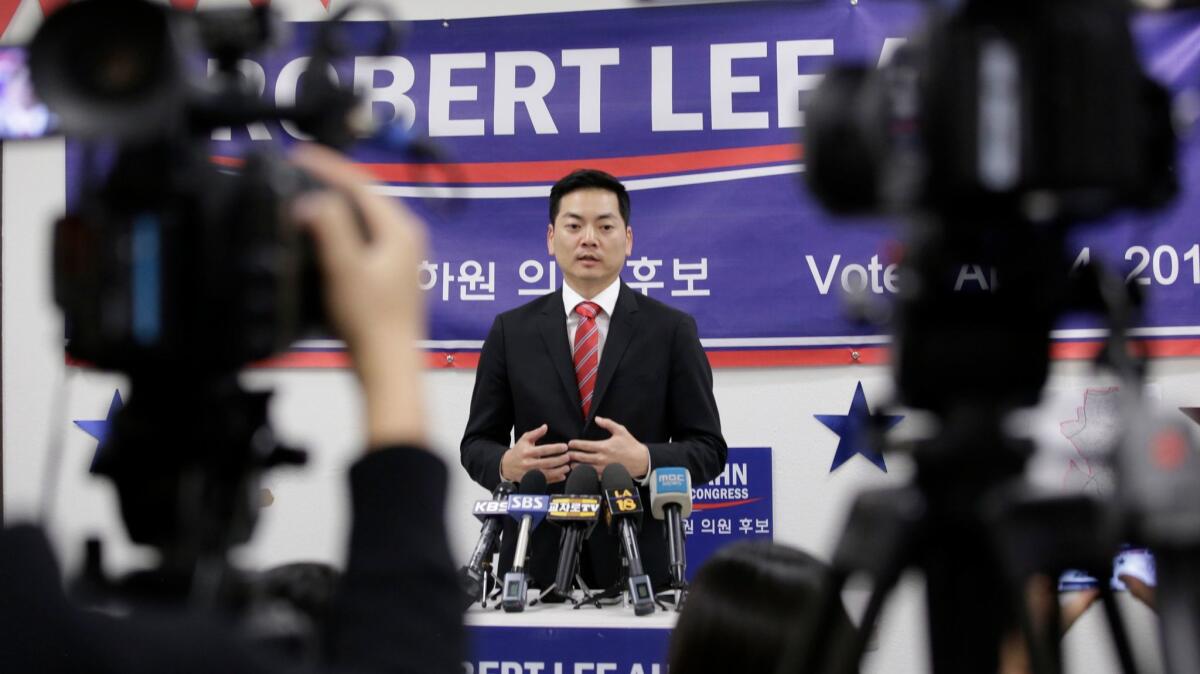Korean Americans have his back, but Robert Lee Ahn will need more to become L.A.’s next congressman

- Share via
The race for the 34th Congressional District in the core of Los Angeles was supposed to be a battle for the soul of the Democratic Party. The two dozen hopefuls vying for a spot in the top-two primary were full of self-proclaimed fighters ready to oppose President Trump and establishment Democrats.
Instead, it’s shaping up to be a contest between the powerful group of Latinos who make up a majority of the district’s voters and the small but politically potent Korean American community, as Assemblyman Jimmy Gomez and former city planning Commissioner Robert Lee Ahn grabbed the runoff spots that will determine L.A.’s next member of Congress.
“This is really ethnic politics 101,” said Matt Barreto, a UCLA professor of political science who helps run the polling firm Latino Decisions.
Ahn, an attorney and a relative unknown in the crowded primary field, surprised many with a victory that vaulted him ahead of multiple Latino candidates in a district where more than half the voters are Latino. If elected in the June 6 runoff, he would be the only Korean American member of Congress and the first in nearly 20 years.
But it wasn’t surprising to anyone who studies the intricacies of identity politics in Los Angeles, or to those who had been paying attention to Ahn’s aggressive focus on Korean American voters.
Ahn’s campaign staff spent dozens of hours registering voters at malls and outside restaurants in Koreatown, signing up hundreds of new voters. Ahn made his pitch at multiple Korean churches in the district, and a large portion of his donor base was from the Korean American community, which helped him raise more money than Gomez in the latter part of the campaign despite a deluge of cash Gomez received from political committees.
And when Virginia state legislator Mark Keam, also a Korean American, flew to Los Angeles to endorse Ahn, a bank of TV cameras from Korean American news stations was there.
Robert Lee Ahn raised the most money by far in latest campaign finance reports »
Daniel Hong, a 38-year-old who works in the film industry, voted for the first time Tuesday even though he’s been a citizen for about 20 years. Hong, who is Korean American, said he read numerous articles about Ahn and received multiple phone calls from his campaign.
“That was the first time anybody has ever reached out to me for my vote,” said Hong as he stood outside a polling place set up in a Korean Presbyterian church.
Deborah Choi, 62, said she voted for Ahn so “he can speak for Korean Americans here.” The first wave of Koreans immigrated to the U.S. “so many years ago,” Choi said, but their representation in the highest elected offices remains low. She hopes her 36-year-old son will one day run for office too.
Though county election officials have yet to process more than 13,000 ballots, the 41-year-old Ahn remains thousands of votes ahead of the third-place candidate, fellow former planning Commissioner Maria Cabildo.
With turnout expected to hover around 15% of registered voters, preliminary returns show Ahn’s strategy paid off big. The biggest strongholds of votes for Ahn centered on Koreatown, Westlake and Chinatown, while the 42-year-old Gomez was ahead in neighborhoods throughout the northeast part of the district.
In early absentee ballot returns headed into primary election day, Korean Americans made up nearly a quarter of votes even though they comprise just 6% of registered voters.
Few Korean Americans have come this close to winning a seat in Congress since 1998, when Republican Jay Kim of Diamond Bar lost to a primary challenger after three terms in office. (David Min, a UC Irvine professor, announced a challenge to GOP Rep. Mimi Walters of Orange County this week.)
“Korean Americans in Southern California have been hungry for political representation for a very long time,” said Taeku Lee, a professor of politics and law at UC Berkeley. Lee said the recent campaign that helped propel David Ryu, the first Korean American elected to the L.A. City Council, may have also helped the community learn on-the-ground skills that mobilized voters in the congressional race.
The symbolism of Ahn’s win was not lost on his supporters Tuesday night.
“It’s very significant,” said Jinha Park, a radiologist who attended Ahn’s election night party at a Mexican restaurant in Westlake. “The Korean American community has always felt voiceless at the federal level.”
The question now, as the two Democrats ready for what could be a costly runoff, is whether Ahn, the son of Korean immigrants, can broaden his appeal beyond the Korean American voters who are motivated to send him to Washington.
He faces a fierce challenge: While progressive candidates to his left spoke passionately about fighting for “sanctuary cities” that protect undocumented immigrants and single-payer healthcare, Ahn emphasized the “business sensibility” he would bring to the office and argued there was room to negotiate with Republicans on certain issues, an idea that could prove unpopular in a district where just 9% of voters are Republican, and where Bernie Sanders beat Hillary Clinton in last year’s presidential primary.
Ahn will also have to make a case to Latino voters, who make up more than half of registered voters in the district, why they should choose him over Gomez. The three-term assemblyman is the son of Mexican immigrants, has amassed dozens of establishment endorsements from Democratic elected officials, labor unions and environmental groups, and touted his progressive record in the Legislature.
Among his backers is Xavier Becerra, who rose to become the highest-ranking Latino U.S. congressman and vacated the seat to become California’s attorney general.
Votes that went to the remaining Latino candidates in the primary made up more than 38% of voters at last count, and the district has sent a Latino to Congress for more than half a century.
“When [Ahn is] running against a guy named Gomez, as good as his outreach might be in the Latino community, Latinos’ gut and heart is going to be more with Gomez,” said UCLA professor Barreto.
Ahn dismissed the idea. “The notion that Latinos will only vote for a Latino … I think we’re really going to transcend that with our campaign,” Ahn said in an interview Wednesday. He appears to be positioning himself as an outsider, which would be similar to the campaign Ryu ran when he made his successful council run in 2015. Ahn called Gomez a “professional politician that is powered by special interests.”
Gomez’s camp shot back, saying voters will see through Ahn’s formidable fundraising and realize his credentials don’t match with the district.
“More than anything, he’s ideologically out of step with the district,” said Parke Skelton, a campaign consultant for Gomez. Skelton said Ahn, who changed his registration from Republican to Democrat in 2012, “has taken positions that really put him out of the mainstream Democratic base in this district.”
For more on California politics, follow @cmaiduc.
ALSO
Results from L.A.’s congressional primary
Updates on California politics
Sign up for our free Essential Politics newsletter
More to Read
Get the L.A. Times Politics newsletter
Deeply reported insights into legislation, politics and policy from Sacramento, Washington and beyond. In your inbox twice per week.
You may occasionally receive promotional content from the Los Angeles Times.











